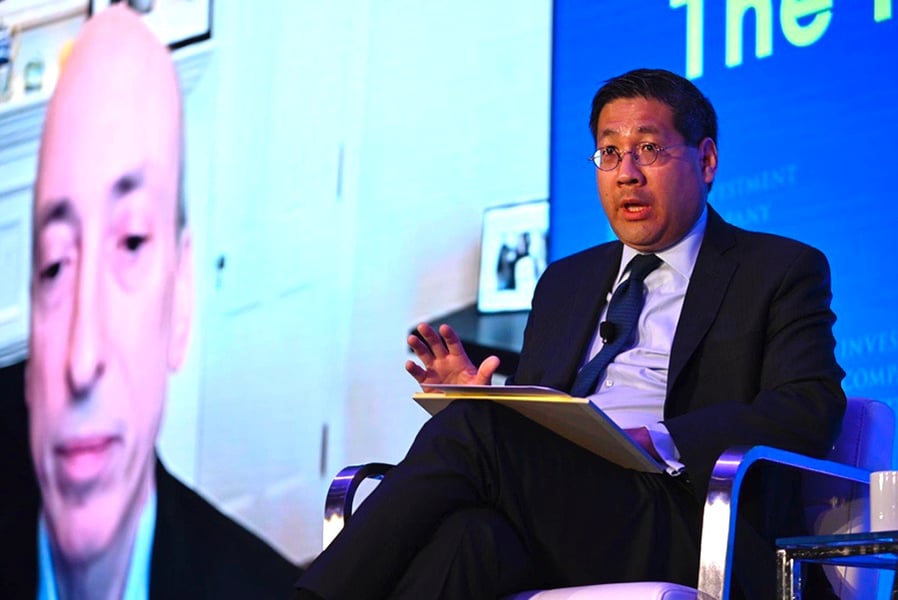

SEC Chair Gary Gensler forcefully defended a mutual fund reform proposal Thursday in front of a skeptical industry audience, throwing punches in a forum where public officials instead sometimes pull them.
In an appearance via video at the Investment Company Institute Leadership Summit in Washington, Gensler praised the mutual funds, exchange-traded funds and money market funds that the trade association represents as important vehicles that help tens of millions of Americans invest in a diversified way.
But Gensler added that there are risks related to fund liquidity and dilution when investors pull out of funds during times of high market stress, such as the 2008 financial crisis and the advent of the coronavirus pandemic in 2020.
Gensler said the SEC needs to update rules for funds that it last addressed in 2014. It’s doing so through a proposal that would reform fund liquidity risk management practices to ensure that the cost of fund redemptions is borne by departing investors.
The fund industry strongly opposes the changes, asserting they would fundamentally alter how funds work and diminish them as investments.
In unvarnished language, Gensler reminded the approximately 750 fund professionals in the ICI audience that the proposal responds in part to pleas they made to federal regulators in 2020.
“At the onset of Covid-19, during the ‘dash for cash,’ again there were calls for fire department support both for money market and open-end bond funds — in other words, Federal Reserve support,” Gensler said. “I’m not going to name any names, but you in the industry who called the SEC and other agencies know who you are.”
He added: “As these real-world events demonstrate, stress on these funds is not an unsubstantiated hypothesis.”
That line seemed to be a direct shot at ICI CEO Eric Pan, who has accused the SEC of regulating by hypothesis. Pan asserts the agency has failed to justify many of the rules it’s pursuing as part of what he and other industry critics have called an aggressive and expansive SEC agenda under Gensler.
In a Q&A with Gensler, Pan pressed him on what problem the SEC is trying to solve with its fund liquidity proposal, which would impose swing pricing and a so-called hard close on orders. Both steps are fiercely opposed by the industry.
Pan suggested the SEC lacks empirical evidence to support the need to overhaul fund rules. He said ICI research shows fund dilution only shaves a fraction of basis points off the investments.
“Ask your members that were making those phone calls in 2020,” Gensler said. “Ask them to look in the mirror and ask why were they calling the Fed and SEC for bailout support.”
Pan countered that sales of open-ended bond funds when the pandemic broke out totaled only about $8 billion, a small amount by market standards. He turned back on Gensler his metaphor about investors trying to avoid a pursuing bear when making fund redemptions during a crisis.
“Is it really a bear? Or are we talking about a cub?” Pan said.
Pan encouraged Gensler to modify the proposal before the agency releases a final rule.
“If we implement some of these rules and regulations as proposed, [it] may result in denying these very, very useful products to middle-class Americans,” he said.
Gensler suggested that the tension between the agency and the industry reflects their different constituencies. The SEC, he asserted, is trying to wring costs out of the middle of the financial markets, where intermediaries such as funds live.
“Our clients are different than your or the other trade associations’ clients,” Gensler said. “It’s going to be natural there’s going to be some [industry] comments that come in because our clients are the 334 million Americans. We’re trying to … drive for greater efficiency. That might [result in] lower economic rents.”
That remark drew a response from Pan.
“We think our clients are also your clients,” he said. “We serve over 100 million Americans. We are definitely coming from the same place when we submit comments to the commission.”
In a session following the Pan-Gensler colloquy, an industry official also took umbrage at Gensler’s implying that the SEC looks out for investors while the industry looks out for itself.
“The most disappointing part was the part that said that we have different constituents,” said Mary Callahan Erdoes, CEO of J.P. Morgan Asset & Wealth Management. “We absolutely have the same constituents.”
She added that the industry “shows up here live,” in a dig at Gensler’s virtual presence.
Although there was more tension than is typical in a conference session, Pan was happy that Gensler agreed to participate in the conference.
“He’s a very passionate person,” Pan said. “I think it’s great that he took the time to speak to us. I would much rather hear it straight from him than to hear it through separate meetings and behind doors. I can only thank him for coming.”

Relationships are key to our business but advisors are often slow to engage in specific activities designed to foster them.

Whichever path you go down, act now while you're still in control.

Pro-bitcoin professionals, however, say the cryptocurrency has ushered in change.

“LPL has evolved significantly over the last decade and still wants to scale up,” says one industry executive.

Survey findings from the Nationwide Retirement Institute offers pearls of planning wisdom from 60- to 65-year-olds, as well as insights into concerns.
Streamline your outreach with Aidentified's AI-driven solutions
This season’s market volatility: Positioning for rate relief, income growth and the AI rebound
